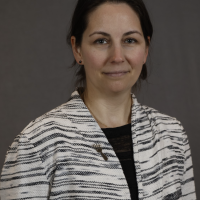What Advocacy Taught Me About Leadership Save

When I first took on the role as the American College of Rheumatology (ACR) Committee on Government Affairs chair, I was keenly aware of being the first woman to be nominated to this position. While the demographics of government officials have changed over the past several decades, governance positions are held overwhelmingly by men. Having my voice heard and advocating for my colleagues at the ACR, and most importantly for our patients, were priorities.
Fortunately, I had the great privilege of incredibly supportive predecessors and access to knowledgeable ACR staff. In addition, I spent time reading about women in Congress in advocacy positions and drew inspiration from their words and actions.
For example, at the start of this role, I wondered how best to use my words to lead a team and inspire others to join in advocacy. In my own backyard was Texas Congresswoman Barbara Jordan, the first Black woman elected to the Texas Senate and the first Southern Black woman to be elected to the US House. She is a powerful orator, and her skills helped usher through Texas the first law on minimum wage. I encourage you to listen to her words. Following her lead, I worked to slow my cadence when speaking and ensure listening was prioritized over speaking when working with our advocacy team and staff.
As a working parent in a leadership position, balancing priorities was paramount. When school or daycare would want something for a class project or be critical about my time spent with my children, my thoughts would go to Representative Pat Schroeder. She once said she submitted recipes for "ice" when asked for gourmet recipes for recipe books. After being asked how she could be a mother and be in Congress, she retorted that she had a brain and a uterus and could use both. I channeled my inner Rep Schroeder while pumping breast milk on the Hill, traveling far from my family, and attending night meetings. Despite the challenges of being a working parent, pushing through would help others.
Perhaps the biggest challenge for me was experiencing how slow healthcare policies change, particularly at the Federal level.
During my tenure as chair I learned about the topsy-turvy rhythm of government, the role of lobbying firms, and how laws are made then interpreted on the administration side. Most importantly, learning that even a few voices—with persistence—can effect change over time. My term was three years and during that time, policies would push forward and many would fail.
We still have nearly half of Universities not supporting paid parental leave, and we struggle to have women in senior leadership roles. When I would become frustrated that we had to fight yet again, despite strong bipartisan, bicameral support, to re-introduce legislation for physicians, I would think about things that have come to pass. In 1970, women in the Department of Defense, who became pregnant, had to quit their jobs. Rep. Schroeder was responsible for making the Pentagon have one of the top day care centers, and have the best parental leave policies and flexible work hours in the country. She also championed the Family and Medical Leave Act. It was inspiring to work with young people on the Hill who wanted to see change for the better. The women and men (Dads Caucus) in Congress need to hear our voices and perceive our presence to pass legislation that helps families work in a supportive environment.
There is hope.
Today, the US Congressional Budget leadership team is held by five powerful women: two Republicans, two Democrats and the first Black woman to lead the Office of Management and Budget. These women who fought to be in leadership roles said, "women bring different life experiences, different perspectives...it matters". When we stand up for others, we are standing up for ourselves.
Advocacy provides a platform for voicing concerns about the patients we treat and the health of our profession. I have found a place to stand up for others in hopes of not only improving healthcare for both patients and physicians, but also normalizing to my daughters and the next generation that women can and should be in leadership positions.
This group of women makes me hopeful that perseverance will effect change. They have inspired me to be persistent, and to keep calling for one voice at a time.










If you are a health practitioner, you may Login/Register to comment.
Due to the nature of these comment forums, only health practitioners are allowed to comment at this time.